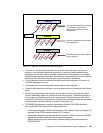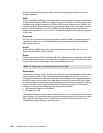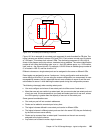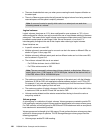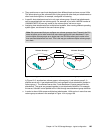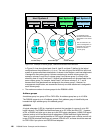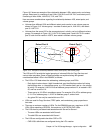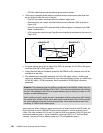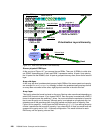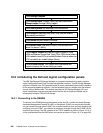
Chapter 10. The DS Storage Manager - logical configuration 199
10.1.2 Summary of the DS Storage Manager logical configuration steps
It is our recommendation that you review the following concepts before performing the logical
configuration. These recommendations are discussed in this chapter.
Planning
When configuring available space to be presented to the host, we suggest that you approach
the configuration from the host and work up to the DDM (raw physical disk) level. This is just
the opposite way that you would configure the raw DDMs into host volumes. Refer to
Figure 10-7 on page 200 to understand the hierarchy in the virtualization layers in the
DS8000.
1. Determine the number of hosts and type of hosts (zSeries or Open System) in the
environment that will use external capacity.
2. Determine the amount of capacity needed for each host and for each data format type.
3. Determine the number and the size of logical volumes needed to fulfill the capacity
requirements for zSeries and open system hosts.
4. Determine the number of rank types (FB or CKD) and the number of ranks per extent pool
to be able to build the specific logical volumes. The recommendation is to have one rank
per extent pool unless the LUN size requires you to spread the LUN on several ranks in an
extent pool.
5. Determine the number of address groups that will be assigned for CKD LSSs and the
number of address groups that will be assigned for FB LSSs, and reserve the
corresponding address group. Note that address group 0 needs to be reserved for
ESCON attachment.
Tip: We recommend that you reserve all LSSs in address group 0 (LSSs 00-0F) for CKD
ESCON attachments because ESCON attachments must use address group 0.



